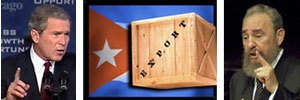
UNITED NATIONS (FinalCall.com) – For the 12th straight year, the United Nations General Assembly voted on November 4 against Washington’s four-decade-old economic embargo against Cuba. This year, the General Assembly gave the resolution its largest plurality, urging the Bush administration to end the trade and travel sanctions against its Caribbean neighbor, with a vote of 179 in favor, three votes against and two abstentions.
The nations voting “no” were the usual three suspects, the United States, Israel and the Marshall Islands.
“Cuba received the express support of important groups of countries for its demand for an end to the blockade,” noted the Cuban newspaper Granma International.
The 15 members of the European Union along with U.S. allies such as Japan, Canada, Australia and New Zealand all voted for the resolution. They said they objected to the so-called “extraterritorial” effects of U.S. legislation that they regard as violating their sovereignty by preventing non-U.S. firms from commercial dealings with Cuba.
The newspaper called attention to the fact that the first speaker, the Mexican representative, started it off speaking in favor of the anti-blockade resolution, and then it was Morocco, on behalf of the Group of 77; Jamaica for the Caribbean Community (CARICOM); and Malaysia, which presides over the Non-Aligned Movement.
“Each of these regional groups expressed their opposition to the prolonged policy of harassment in violation of the UN Charter, international law and freedom of trade and navigation,” the newspaper said.
Speaker after speaker addressed the need to eliminate the unilateral application of measures of an economic and commercial nature affecting the unfettered development of international trade, and to support the resolution presented by Cuba.
Vietnam referred to interference in the sovereignty of states and the non-justification of a blockade that has been unable to force Cubans to give up their efforts to construct a new civil society.
The Namibian representative maintained that the application of the American policy constituted an obstacle to the Millennium Development goals, while the South African diplomat lamented that the issue had to be discussed yet again, despite repeated calls from the international community to the U.S. The South African representative added that it is “no surprise” that the overwhelming majority continues to support the anti-blockade resolution.
The Tanzanian diplomat spoke of the violations to freedom of trade and how the U.S. government continues to cause damage to the Cuban economy.
Venezuela shared the general condemnation of the U.S. measures, which they said constituted a flagrant violation of the human rights of the Cuban people. The South American nation called on the General Assembly to adopt measures to repeal the American legislation that supported the embargo.
Sudan reiterated the right of nations to their self-determination, and urged a rejection of attempts to impose unilateral decisions against nations. Iran called for the international community to be more proactive in its opposition to the Cuban blockade, saying that nations must apply “political pressure.”
Guinea noted that the continuity of the proposal in the UN symbolizes cohesive world opposition to America’s hostile measures against Cuba. The representatives of Zambia, Myanmar, Syria, Indonesia and Laos spoke in similar terms.
But the U.S. representative had another take on the issue. “Cuba’s best day is when the Cuban people have terminated Castro’s evil Communist dictatorial regime and said to him, “Hasta la vista, baby,” U.S. representative Sichan Siv said.
Angry at what he perceived as an insult to President Fidel Castro, Cuba’s Foreign Minister Felipe Perez Roque said, “It is the people of Cuba who say ‘Hasta la vista’ to the blockade, ‘Hasta la vista’ to genocide.”
Mr. Siv, a native of Cambodia, who gave half of his speech in Spanish, said the embargo would be lifted when Cuba changed its human rights record and opened its system to trade.












